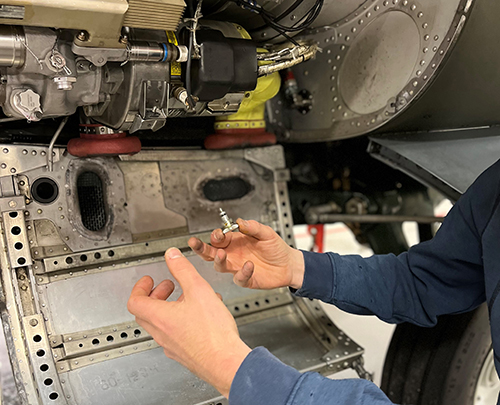New dedicated lab for tomorrow’s aviation fuel
The lab that will take us closer to the aviation fuel of the future has now opened. The Jet Engine Lab at the Faculty of Engineering (LTH) makes it possible to conduct full-scale studies on how engines are affected by new fuels – knowledge that will become increasingly important when fossil-based aviation fuels are phased out and replaced by more sustainable alternatives.
Jessika Sellergren – Publicerad den 23 September 2022

The Jet Engine Lab is at LTH’s School of Aviation in Ljungbyhed and will be used by researchers within the School of Aviation, energy sciences, physics and chemical engineering. It also has close connections with the companies that produce several of the fuels being tested.
One of the researchers who benefits considerably from the new lab is Elna Heimdal Nilsson. She is senior lecturer in combustion physics at LTH and assistant coordinator of the CESTAP centre of excellence, which focuses on sustainable turbine fuels for aviation and power generation.
Elna Heimdal Nilsson has studied biofuels for the past 15 years.
“Our aircraft is to be running on renewable fuel by 2045. To achieve that requires increased knowledge about both aircraft engines and fuel composition. The Jet Engine Lab enables us to study the interaction between the fuel and the engine in a realistic context and on an authentic scale – something we have not been able to do previously,” she says.
New fuels are also to work in older engines
The Jet Engine Lab is located at Ljungbyhed Airport in an engine testing facility that is now equipped with complete aircraft engines in order to test new fuels. Johan Bergström, head of department for the School of Aviation, who is in charge of the lab, says:
“A fuel affects the material of an engine and if the fuel changes, the engine may also need changes. In the lab we can test how the engine is affected and what adjustments need to be made.”
Adjusting aircraft engines according to the fuel is essential. An engine is expected to be in service for at least 30 years. Replacing the engines of an entire fleet of aircraft is therefore neither environmentally nor economically sustainable.
A need for life-cycle analysis
A new fuel that is developed now can be used at the earliest in ten years’ time. The certification process for aviation fuel takes a particularly long time because there is such a high safety standard. The development of new aviation fuels is also linked to several other challenges that need to be solved in a synchronised way – factors that affect the timing of when we can actually fly using our new fuels,” explains Elna Heimdal Nilsson.
“While the fuel’s combustion and emissions are being analysed, production, storage and distribution needs to be addressed in parallel,” says Elna Heimdal Nilsson, who emphasises the need for life cycle analysis of renewable fuels:
“We need an overall picture of how a new fuel interacts with an ecosystem and the climate and how it affects health. There must be a greater understanding that a fuel with a small climate impact may perhaps also have an impact on health.”
New lab attracts considerable interest
Some 50 people from academia, industry, municipalities and public authorities attended the inauguration of the new Jet Engine Lab. One of them was Annika Olsson, dean of LTH, who says:
“What could be more appropriate right now than an initiative for sustainable bio-based aviation fuel in a collaboration between industry and academia?”

Jet Engine Lab
The Jet Engine Lab is situated at the School of Aviation in Ljungbyhed, which is a department at LTH. The lab, which is a resource for researchers, students and industry, is equipped with three aircraft engines on loan from the Swedish Armed Forces. The lab is headed by Johan Bergström, senior lecturer in risk management and societal safety, and head of department for the School of Aviation.
CESTAP
CESTAP is a centre of excellence for sustainable turbine fuels for aviation and power generation that can stimulate the production and use of fossil-free fuels within the aviation and power industries. One possible raw material for fuel production that is of interest to the researchers is lignin, a residual product from the forestry industry. In the pulp and paper industry, lignin is one of the by-products that has so far been used for energy and heating. Now, investigations are focusing on whether lignin could also be used as fuel. CESTAP, coordinated by Christer Fureby, professor of energy sciences at LTH, is funded by the Swedish Energy Agency.

